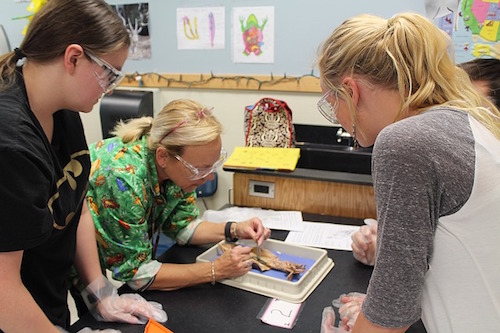 Education
Education
 Evolution
Evolution
From the American Geophysical Union, Errors and Misconceptions About Science Education

This month, the American Geophysical Union reaffirmed its statement on evolution and the history of the earth in science education. Their position says much the same as we’ve heard again and again from similar groups, such as the National Academy of Sciences: there is no scientific debate over evolution.
Unfortunately for schoolchildren, they’re wrong. The statement notes:
AGU affirms the central importance of including scientific theories of Earth history and biological evolution in science education. Within the scientific community, the theory of biological evolution is not controversial, nor have “alternative explanations” been found. This is why no competing theories are required by the U.S. National Science Education Standards. Explanations of natural phenomena that appeal to the supernatural or are based on religious doctrine — and therefore cannot be tested through scientific inquiry — are not scientific, and have no place in the science classroom. [Emphasis added.]
First, it is not true that objections to evolution come primarily from religious, not scientific sources. Second, there is growing debate among scientists over neo-Darwinism.
There are numerous other misconceptions and errors here. The statement seems to imply that those who critique evolution and its ability to generate major biological novelties favor removing the subject from classrooms. That is not the case at all. Citing science standards, as the statement does, begs the question. Whether those standards contain something or not isn’t the determining factor of whether it’s scientific, or whether the favored theory should be taught critically or uncritically. And as a factual matter, the Next Generation Science Standards, not the NSES, are the current standards being pushed nationally.
But why does AGU think it is important to teach evolution? Two reasons: economics and an “aesthetic” consideration.
“An increasingly complex and competitive international economy calls for a scientifically literate public,” the AGU writes. This is true, but learning evolution dogmatically won’t build science literacy.
AGU also praises the “aesthetic” benefit of learning evolution — “the gaining of a sense of awe and wonder at the beautiful complexity of our dynamic planet and the integral role of its evolving biological component throughout much of its history.” Evolutionary advocates should really get together and decide whether they think awe is a good thing or a threat to science. See our post last week, “Psychologists Say ‘Awe’ in the Face of Nature Is a Problem for Science.”
Our view is that awe is indeed a good thing and an inspiration to scientific discovery. But the truth — that our incredibly diverse universe poses a profound mystery — is far more awesome than some sterile, packaged talking points.
Image credit: lcr3cr via Pixabay.
